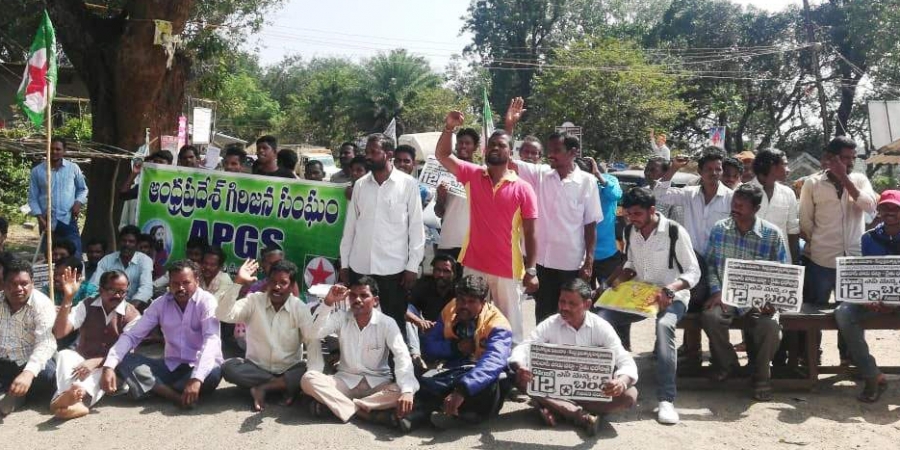
Tribals in Andhra’s Visakhapatnam want ‘outsiders’ evicted

Away from the glare of national media, tribal communities in Andhra Pradesh’s Visakhapatnam district have been waging a silent battle to assert their rights over lands and local jobs. They have now intensified their agitation, demanding eviction of non-tribals from their areas.
At a time when immigration and identity have become the most contested narratives across the country, the tribals in the scheduled areas of Visakhapatnam district are on a warpath, targeting non-tribals dubbing them as outsiders who are out to destroy the local culture and identity and steal jobs.
Several tribal organisations have formed a Joint Action Committee (JAC) and intensified their agitation demanding that all non-tribals, who have set up small businesses in the scheduled areas, be sent back and all tribal laws, including the rights over forest lands, be implemented in letter and in spirit.
Shutdown in tribal areas
The tribal organisations enforced a shutdown on Tuesday (January 7) in parts of Visakhapatnam district in north coastal Andhra Pradesh, covering 11 Mandals (revenue administrative units equivalent to taluks), in support of their charter of demands.
The JAC leaders have demanded the eviction of non-tribals from the scheduled areas (called ‘agency’ areas in local parlance), cancellation of identity cards given to the non-tribals to set up their businesses and constitution of a high-level judicial tribunal to implement all tribal acts that ensure protection to local tribal communities.
“We want the state government to withdraw all the facilities provided to the non-tribals in the region including ration cards and voter enrolment cards. We want them to vacate our lands,” said JAC leaders B Chinnaiah Padal, Mettadam Rajababu and Lochali Ramak.
Also read: Target tribals: the BJP’s strategy in Jharkhand
The tribal organisations have also been demanding that the government take over all the buildings constructed by non-tribals in scheduled areas and protect the interests of the tribal communities in tune with the constitutional guarantees provided to them.
The JAC is also planning to approach the local panchayats and ask them to identify the non-tribals living in their respective areas and also those tribals who are acting as ‘benamis’ for non-tribals owning big chunks of lands and running businesses.
According to JAC leaders, several non-tribal traders had approached courts and obtained stay to continue their businesses in the scheduled areas. “The ITDA (Integrated Tribal Development Agency) should get all such stays vacated and restore the rights of tribals,” JAC leaders said.
Violent history
The tribal-dominated villages had witnessed violent clashes in the past between local tribals and non-tribals who were allowed by the successive governments to live in these villages and carry out their businesses. There is a specific law in Andhra Pradesh for protection of tribal rights in the scheduled areas. It is called the Land Transfer Regulation Act 1 of 1970, popularly known as 1/70 Act. The Act checks the transfer of tribal lands to non-tribals.
The JAC leaders alleged that there had been gross violations of the Act with regard to allotting mining leases in the scheduled areas to non-tribals and allowing non-tribal persons to own benami houses, lodges and hotels. “Many non-tribal persons own and run mines and hotels and lodges by having a benami tribal as the owner. They reap profits without giving back anything for the development of the tribal areas,” alleged K Surendra, a member of the JAC.
As per a survey conducted in 2008, there were about 650 such unauthorised cases in Araku division alone and over 2,000 across the 11 Mandals in the scheduled areas. The Telugu Desam Party (TDP) government in combined Andhra Pradesh made an attempt in 2000 to amend the act to allow bauxite mining in Chintapalle tribal area which has more than 550 million tonnes of the ore used to make aluminium.
However, following protests from the opposition, local tribal organisations and environmental activists, the government was forced to step back.
Also read: Thousands of tribals benefit from literacy drive in Kerala
Bauxite mining
The repeated attempts by the successive governments in the past to take up bauxite mining in the district had triggered anger among the tribal communities. The issue was one of the key rallying points for the opposition parties as well. Soon after taking over the reins of the state in May last year, the Chief Minister YS Jagan Mohan Reddy ordered the withdrawal of a government order on bauxite mining and assured that his government would not take up mining in the district which is part of the environmentally fragile Eastern Ghats.
The announcement, made in June last year, was widely welcomed by the social and environmental activists. Incidentally, the order was issued in November 2005 when Jagan’s father YS Rajasekhar Reddy was the Chief Minister of combined Andhra Pradesh. The plan was to involve the state-owned AP Mineral Development Corporation to undertake mining in 1,212 hectares of reserve forest area in Chintapalle and Jerella blocks of Visakhapatnam district.
However, the subsequent governments chose not to go ahead with the proposal due to widespread opposition in the region. The failure to scrap the order had triggered widespread protests from anti-mining activists.
“The minerals like bauxite/alumina are scarce resources. Aluminium is a strategic metal that is used widely in the aviation industry and other manufacturing processes in the west. The price at which Indian miners export alumina is several times lower than the global price, which implies enormous scope for corruption and black money generation,” the retired IAS officer and environmental activist EAS Sarma said.


